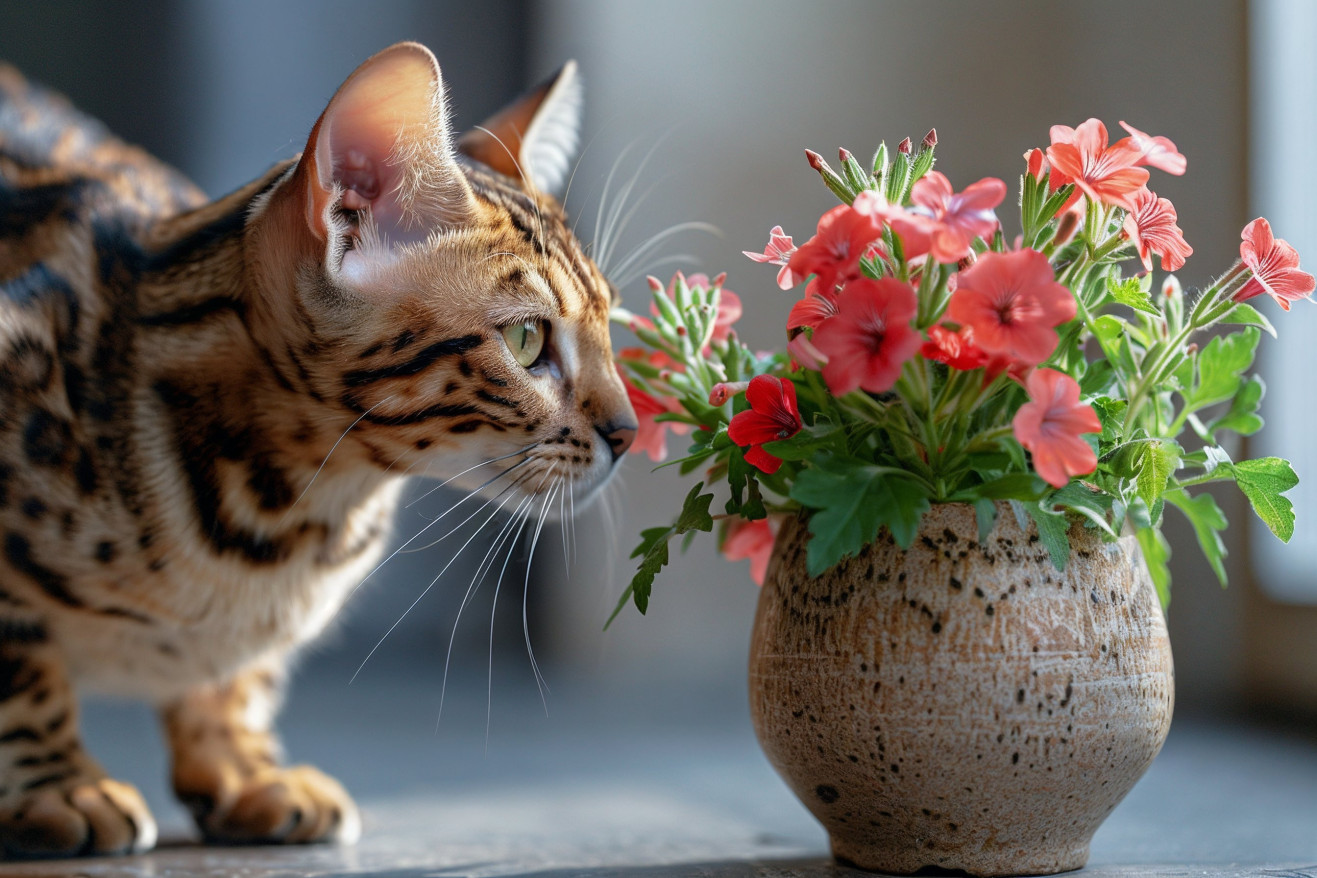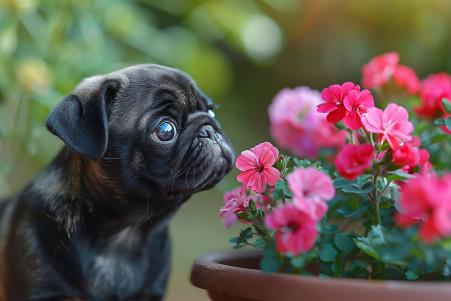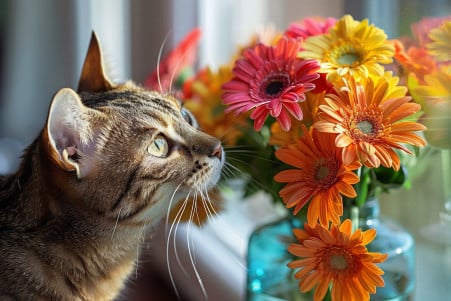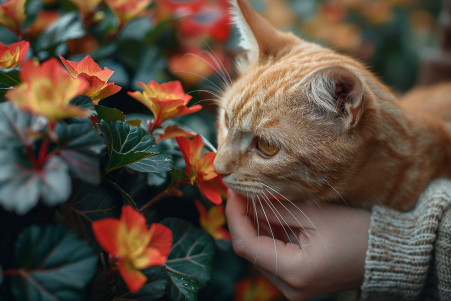Can Cats Eat Geraniums? What You Need to Know
22 April 2024 • Updated 21 April 2024

Geraniums are a common type of flowering plant that many people keep in their homes or gardens, but if you're a cat owner, you may be worried about whether or not geraniums are safe for your pet. While most geraniums are not poisonous to cats, some can cause mild gastrointestinal issues such as vomiting and diarrhea. That said, the sensitivity of individual cats can vary, so it's always best to keep your cat from eating geraniums and to remove any dead leaves or flowers that they may have ingested.
To help you better understand this topic, we'll take a closer look at scientific research and expert opinions on the toxicity of different types of geraniums. By examining in-depth research and personal experiences, you'll learn which geraniums are toxic, which are non-toxic, and how you can make sure your cat is safe around these popular plants.
Are geraniums poisonous to cats?
Non-Toxic Geraniums to Grow in a Garden Safe for Cats
According to Plant Addicts, perennial geraniums, also known as hardy cranesbills (Geranium spp.), are non-toxic and won’t harm cats. Both the Woolly Geranium and Meadow Geranium (Cranesbill) have no toxic principles and are therefore safe for cats. Even Pelargonium alternans, a type of scented geranium, is non-toxic to cats.
These non-toxic geraniums can be planted without worry in gardens where cats roam, and they are great options for cat-friendly gardens. In addition to being hardy and frost-tolerant, cranesbills have even been used medicinally and as insect repellents. Some, like the Woolly Geranium, are even safe for cats to eat, although eating too much can lead to mild stomach upset. By choosing non-toxic geraniums, you can enjoy their colorful flowers without worrying about the safety of your cats.
How to Grow Geraniums in a Home With Cats
If you want to grow geraniums in a home with cats, it’s important to make sure that any toxic varieties are kept in a place where your cat can’t access them. According to Gardening Know How, plant stands, cages, or even taste or smell deterrents can be used to keep cats away from toxic plants. On the other hand, Greg.app suggests that you might want to consider growing non-toxic plants like spider plants or cat grass instead.
In the event that your cat does eat a toxic geranium, wikiHow recommends removing any plant material from the cat’s mouth and contacting a vet immediately. It’s also important to watch for symptoms like vomiting, lethargy, and skin irritation and to make sure that your cat gets medical attention if any of these symptoms occur.
First Aid and Treatment of Geranium Poisoning in Cats
If a cat has ingested a toxic geranium, it's important to act fast. According to wikiHow, symptoms of geranium poisoning in cats include vomiting, depression, seizures, and respiratory distress. Remove the cat from the source of the poisoning immediately and call your veterinarian or a pet poison control hotline like the ASPCA Poison Control Center or Pet Poison Helpline.
If you can, find out exactly which type of geranium the cat ingested and how much was eaten, as this information will be helpful to the veterinarian. According to WagWalking, you should also follow the vet's advice on whether to induce vomiting, give activated charcoal, or provide supportive care like fluids to help the cat's body rid itself of the toxins. It's important to get the cat to the vet as soon as possible because early intervention can help prevent complications from geranium poisoning.
Toxic Compounds: What Is It In Geraniums That Is Toxic to Cats?
All parts of toxic geranium varieties, including stems, leaves, flowers, and roots, contain harmful compounds like geraniol and linalool that can be toxic to cats if ingested, according to Greg.app. The Sweet Scented Geranium and Ivy Geranium are two varieties that contain these essential oils, which can cause gastrointestinal issues and other symptoms in cats.
The Zonale Geranium is another toxic variety that can lead to skin irritation, vomiting, and depression if ingested by cats, as noted by the ASPCA. The severity of symptoms depends on the amount of the plant consumed and the cat's individual sensitivity. Immediate veterinary attention is required if a cat ingests a significant amount of any toxic geranium variety, as outlined by VCA Hospitals.
To ensure the safety of cats, it's best to choose non-toxic plant options, which we'll discuss in the next section.
Other Pet-Safe Alternatives to Geraniums
Spider plants, African violets, and Venus fly traps are all non-toxic and safe for cats according to Architectural Digest. Meanwhile, succulents like echeveria and haworthia, as well as air plants and bromeliads, are all great pet-friendly options according to The Spruce. Chinese money plants, palms, and ferns are also safe for homes with cats, according to Prevention.
No matter what plants you choose, it's important to always look into their toxicity and potential danger to pets, according to Lively Root. In addition, keeping toxic plants out of reach or in separate rooms can help ensure that cats don't accidentally eat them, which is especially important for cat owners, according to The Sill.
Conclusion: How to Protect Your Cat From Geranium Poisoning
While not all geraniums are toxic to cats, it's important to be careful about growing scented geraniums around cats. The symptoms of geranium poisoning in cats can vary in severity based on the amount of the plant that the cat ingests. It's important to seek veterinary care if a cat consumes a toxic variety of geranium.
The best way to prevent accidental exposure is to grow non-toxic plants and keep toxic plants out of your cat's reach. By being mindful and taking the right precautions, cat owners can grow geraniums while keeping their cats safe.


